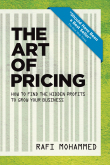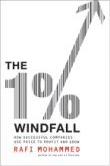Our Pavlovian Response to High Prices...Pleasure!
While waiting for a table at my favorite Los Angeles restaurant recently, I struck up a conversation with a well respected entertainment executive. After explaining that I was writing a book on pricing strategy, he unabashedly commented: “Rafi, I LOVE anything that is expensive: the higher the price, the more I like it.” And then he helpfully instructed me to “be sure to put that in your book.” While many of you are shaking your heads in amused disbelief…guess what? My Armani clad new acquaintance was only being honest in revealing the guilty pleasure that many of us derive from consuming high priced products. New research has found that we, as consumers, tend to associate high prices with pleasure.
Baba Shiv, Hilke Plassmann, Antonio Rangel, and John O’Doherty, researchers at Stanford University and Cal Tech, recently conducted a fascinating experiment investigating the correlation between price and pleasure. They sought to measure how the perceived price of wine affects the pleasure our brain experiences. To measure pleasure, 11 students, who enjoyed wine, sampled wine while hooked up to an MRI machine. The MRI was used to detect activity in the part of the brain that experiences pleasure, the medial orbitofrontal cortex, or mOFC, in the forehead.
Students sampled several wines and were told that each wine was different. The price of each wine was listed on each sample. Here’s where it gets interesting. One wine, which costs $5 a bottle, was sample twice by each student. One sample listed a price of $5, while the other showed $45. So the question is would each subject’s brain register more pleasure when they thought the price was $45 as opposed to $5?
Similarly, one (presumably better) wine which actually costs $90 was also sampled twice. One price tag was $90 while the other was $10. Would the $90 price tag generate more pleasure than a $10 one?
The results were interesting.
- Each student felt that every wine they tasted was different (even though two wines were sampled twice).
- They identified wines with more expensive price tags as better than those with lower listed prices.
- And most interestingly, researchers found that an increase in the perceived price led to increased activity in the mOFC part of each subject’s brain.
So what do you think? Does this experiment mirror how you associate price and pleasure? While I’m intrigued by a high price, I’m sure that my MRI would go off the charts the moment I figured out how to wrangle a 50% discount off the high price!





I would have a little more respect for your entertainment executive if he said "I like the finest in clothing, cars etc. and will pay anything i have to to get it". The mere fact that it's expensive doesn't mean it's the best. As for the wine tasters, I think most people don't know nearly as much about quality wine as they think they do. (Including me)